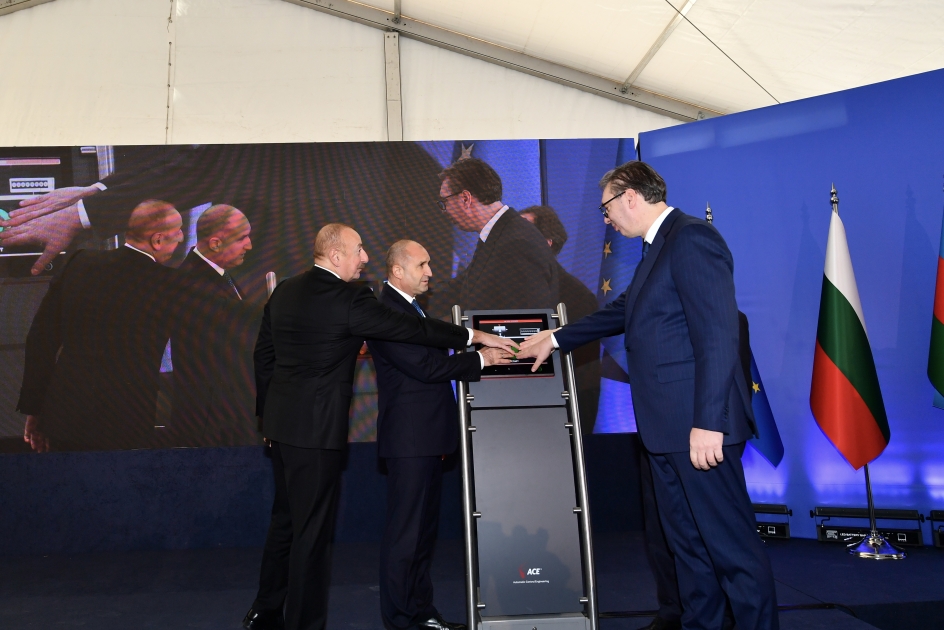Black Sea Energy project: A new energy source for Europe from Azerbaijan and Georgia
Black Sea Energy project
Azerbaijan, Georgia, Romania, and Hungary have signed an agreement in Bucharest to establish a joint venture for the Black Sea Energy project. Azerbaijani Energy Minister Parviz Shahbazov announced this development.
“The Bucharest meeting of the ministers and the steering committee for creating a ‘green’ energy corridor between Azerbaijan, Georgia, Romania, and Hungary has concluded with significant results towards implementing the quadrilateral agreement and establishing Azerbaijan as a green energy supplier for Europe. The signing of the shareholder agreement has led to the creation of a joint venture for the project,” the minister wrote on social media.
- “Rearming Armenia poses risks for the entire region.” Comment from Baku
- Armenian government does not reveal compensation amount for border residents
- «Distant grey island» — a report from Pirallahi, Azerbaijan
What happened?
An agreement was signed on September 3 in Bucharest during the 8th meeting of the Black Sea Energy project at the ministerial level of four countries.
The shareholders’ agreement to create the Green Energy Corridor joint venture was signed by the system operators from Azerbaijan, Georgia, Romania, and Hungary—Azerenergy, Georgian State Electrosystem, Transelectrica, and MVM.
This was announced by the Ministry of Energy of Azerbaijan.
“The joint venture and working group have been tasked with accelerating joint processes with the consulting company to complete the project’s feasibility study within the set deadlines, preparing an action plan for the joint venture before the next ministerial meeting, and starting consultations on the project’s business models. The Green Energy Corridor will finance the feasibility study, oversee its preparation and implementation,” the statement said.
Additionally, it was decided to collectively apply for status within the process initiated by the European Commission in September 2024 regarding the second list of projects of common interest (PCI/PM).
What is Black Sea Energy?
On December 17, 2022, Azerbaijan, Georgia, Romania, and Hungary signed an agreement in Bucharest for a strategic partnership to build the Black Sea Energy underwater electric cable. This cable will have a capacity of 1 GW and stretch 1,195 kilometers across the Black Sea.
In June 2023, Bulgaria announced its intention to join the project.
In May 2024, the energy operators from Azerbaijan, Romania, Georgia, and Hungary signed a memorandum to establish a joint venture for the Black Sea Energy project.
The Black Sea Energy underwater cable project aims to create secure energy sources for Europe. The project’s main priority is to deliver renewable energy to Romania via the underwater cable, which will pass through Azerbaijan and Georgia.
The project, with an initial budget of $2.3 billion, is expected to be operational by 2029.
Overall, Azerbaijan’s renewable energy potential includes 27 gigawatts on land and 157 gigawatts in the Caspian shelf. By 2027, 4 gigawatts of this potential will be realized, with 80 percent intended for export. This figure is expected to soon increase to 25 gigawatts. Azerbaijan plans to add an extra 6 gigawatts of capacity by 2027.
“Szijjártó expressed hope that the EU will provide financial support for infrastructure development”
Earlier, at the opening of the 8th Black Sea Energy project meeting, Zoltán Kovács, the spokesperson for the prime minister of Hungary, referenced Hungarian foreign minister Péter Szijjártó in a social media post on X. Kovács reported that the project, which aims to import green electricity from Azerbaijan and Georgia to Hungary and Romania in the future, is nearing practical implementation.
“During the meeting in Bucharest, which focused on the Hungarian-Azerbaijani-Georgian-Romanian green energy partnership, Minister Szijjártó emphasized the importance of energy security as a crucial element of national security in these challenging times,” Kovács wrote.
He also noted that Szijjártó outlined Hungary’s energy strategy, which is based on four pillars: expanding nuclear capacity with the construction of two new reactors at the Paks Nuclear Power Plant, significantly increasing solar power capacity, seeking cooperation with reliable energy suppliers, and incorporating new supply routes.
“The Minister highlighted the ‘Azerbaijan-Georgia-Europe through the Black Sea’ Green Energy Corridor project as a prime example that will introduce new energy sources from Georgia and Azerbaijan, enhancing Hungary’s energy resilience. Szijjártó also noted that the project is progressing rapidly, with participating countries’ energy companies establishing a joint venture and planning to soon sign an amended green energy partnership agreement,” the post stated.
The Hungarian foreign minister also expressed hope that the EU would provide financial support for the infrastructure needed for the project, pointing out that “the success of such projects often depends on funding.”
Szijjártó also noted that the 1,100-kilometer underwater cable would set a record for length and facilitate the import of green electricity once completed.




















